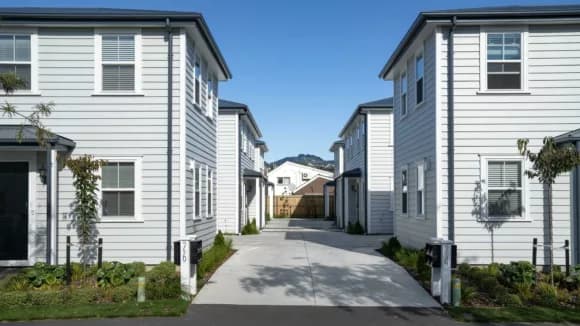
Property Investment
What happens at the end of the Nest Egg strategy
How do property investors turn equity into income? This guide explains what happens at the end of the Nest Egg strategy, step by step.
3 min read

Author: Andrew Nicol
Managing Director, 20+ Years' Experience Investing In Property, Author & Host
Reviewed by: Ed McKnight
Resident Economist, with a GradDipEcon and over five years at Opes Partners, is a trusted contributor to NZ Property Investor, Informed Investor, Stuff, Business Desk, and OneRoof.
Number superstition is common in most cultures. Property letterboxes appear to be no exception, writes Andrew Nicol.
Does the number on the letterbox impact your property’s value? Some cultures, especially Chinese consider the number 8 as lucky. It rhymes with the Chinese word for ‘prosper’.
The number 4 on the otherhand is unconsidered unlucky. It rhymes with the Chinese word for ‘death’.
Some real estate agents say buyers will pay more for a house that has an 8 on the letterbox. Whereas buyers may pay less when a property that is number 4 on the street.
Researchers attribute this phenomenon to "cognitive bias". There’s no logical reason why number 4 or 8 should be lucky or unlucky. But our culture can make us act in different ways.
But an aversion to certain numbers is not specific to just Asian cultures. In Western culture, the number 13 is widely considered unlucky. Some buildings and hotels skip floor number 13 entirely.
Throughout New Zealand, the number of letterboxes with the digit 13 is merely 25,000. Far below 35,000 and 34,000 counted for numbers 12 and 14, respectively. Up until 2009, the entire city of Palmerston North boycotted the number 13 on all of its streets.
But will buyers really pay more (or less) based on the letterbox number? Read a different study and you’ll get a different answer.
A study from 1999 showed Auckland properties with an 8 on the letterbox sell for 2.4% more when compared with a similar different-numbered property.
When the study was repeated with data from 2006, University of Auckland researchers with found that price premium fell to 1.4%.
By 2015 the price difference disappeared. According to that study, properties with a lucky number no longer sell for more money.
But a different study from the Auckland Centre for Financial Research tells a different story. They looked at Sydney and found that the lucky number price premium depends on where you look.
Across all of Sydney, a number 4 or 8 on the letterbox had no significant impact on property values. But in suburbs with higher Chinese populations, ‘lucky’ and ‘unlucky’ numbers on the letterbox do make an impact.
In this case, properties with the number 8 sold for approximately 1.4% more. While houses with the number 4 sold for 3.9% less.
Intuitively it makes sense. If you live in an area with a large Chinese population, the number on the letterbox could make a difference to your property’s price.
So where could letterbox numbers have a larger impact on property prices? Auckland has a large share of New Zealand’s Chinese population. There are 250,000 Chinese New Zealanders, of which 70% live in Auckland.
11% of Aucklanders are Chinese. That compares to 6% in Wellington City and 5% in Christchurch.
Because Chinese communities place importance on numerology, a number 8 or 4 on the letterbox could impact the property’s value more in Auckland compared to in Southland. Only 1% of Southland’s population is Chinese.
There are also differences within Auckland itself. 25% of people living in Howick (Auckland) are Chinese. That compares to only 2% in Rodney.
Across New Zealand, the number on your letterbox is unlikely to affect your property’s value.
But in places like Howick and Upper Harbour, more Chinese New Zealanders call these places home. So pay more attention to the number on the letterbox. Not only can they impact the sale price, those properties can also take longer to sell.
Personally, I've never considered buying a house based on the letterbox number. A lot of people don't give it a second thought. But this is one of those factors that are important for some people, and not for others.
Managing Director, 20+ Years' Experience Investing In Property, Author & Host
Andrew Nicol, Managing Director at Opes Partners, is a seasoned financial adviser and property investment expert with 20+ years of experience. With 40 investment properties, he hosts the Property Academy Podcast, co-authored 'Wealth Plan' with Ed Mcknight, and has helped 1,894 Kiwis achieve financial security through property investment.
This article is for your general information. It’s not financial advice. See here for details about our Financial Advice Provider Disclosure. So Opes isn’t telling you what to do with your own money.
We’ve made every effort to make sure the information is accurate. But we occasionally get the odd fact wrong. Make sure you do your own research or talk to a financial adviser before making any investment decisions.
You might like to use us or another financial adviser